used变否定句和一般疑问句练习题
小升初英语句型:否定句、一般疑问句、特殊疑问句专题练习(试题)-英语六年级下册通用版
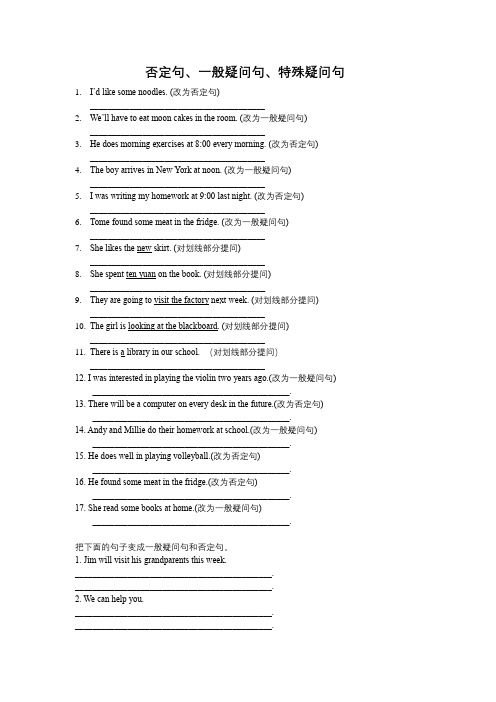
否定句、一般疑问句、特殊疑问句1.I’d like some noodles. (改为否定句)________________________________________2.We’ll have to eat moon cakes in the room. (改为一般疑问句)________________________________________3.He does morning exercises at 8:00 every morning. (改为否定句)________________________________________4.The boy arrives in New York at noon. (改为一般疑问句)________________________________________5.I was writing my homework at 9:00 last night. (改为否定句)________________________________________6.Tome found some meat in the fridge. (改为一般疑问句)________________________________________7.She likes the new skirt. (对划线部分提问)________________________________________8.She spent ten yuan on the book. (对划线部分提问)________________________________________9.They are going to visit the factory next week. (对划线部分提问)________________________________________10.The girl is looking at the blackboard. (对划线部分提问)________________________________________11.There is a library in our school. (对划线部分提问)________________________________________12. I was interested in playing the violin two years ago.(改为一般疑问句)_____________________________________________.13. There will be a computer on every desk in the future.(改为否定句)_____________________________________________.14. Andy and Millie do their homework at school.(改为一般疑问句)_____________________________________________.15. He does well in playing volleyball.(改为否定句)_____________________________________________.16. He found some meat in the fridge.(改为否定句)_____________________________________________.17. She read some books at home.(改为一般疑问句)_____________________________________________.把下面的句子变成一般疑问句和否定句。
小升初英语变否定句,一般疑问句练习

句型转换练习练习一:肯定句变否定句:1. There is some milk in the bottle .There ____ __ milk in the bottle .2. They have already been to America .They have ________ been to America ________ .3. Both of the twins are studying in No. 1 Middle School .______ of the twins _______ studying in No. 1 Middle School .4. All of the students are in the classroom .______ of the students _______ in the classroom .5. They have sports after school .They _____ ______ sports after school .6. I am a student from Wuhan.(变否定句)I _______ _______ a student from Wuhan.(2009年一中分班考试)7. Lucy's father reads newspapers every morning._______________________________________________________________.8. The twins always go to school by bus._________________________________________________________________.9. The old lady bought a pair of red shoes last week._________________________________________________________________.10. Transformers will be on tomorrow.__________________________________________________________________.11. They are watching an action movie.__________________________________________________________________.练习二:肯定句变一般疑问句:1. She gets up at 6:00.(变一般疑问句)________ she ________ up at 6:00?2.There is some fruit juice in the glass. ____ _____ ____ fruit juice in the glass?3.He has to stay here. ______ he ______ to stay there?4. We do eye exercises every day. ______ you ______ eye exercises every day?5. She has something to eat. ______ she ______ ______ to eat?6.I am good at singing and dancing. ______ you good at singing ______ dancing?7.My brother can spell his name. ____________________________8. She will get up at 6:00 tomorrow. _________________________9. She is writing a letter.____________________________10. They get up at 6:00 every day.____________________________11. They are palying football.____________________________12.You can sit down. ____________________________练习三:对划线部分提问:1.They bought a new bike yesterday.______________________________________________2.She is a nurse ._____________________________________________3.She is my teacher.____________________________________________4.He bought the red one ._______________________________________________5.It is my coat .________________________________________________6.I am looking for my sister .________________________________________________7. My brother is tall . ________ is your brother _______ ?8. There is a little orange juice in the bottle .______ ______ orange juice is there in the bottle ?9. We have learned English for six years . ______ ______ have you learned English ?10. Li Lei goes to see his grandparents once a week .______ _______ does Li Lei go to see his grandparents ?11. I’ll come back in no time . ______ _______ will you come back ?12. There are none of the students in the classroom ._______ _______ students are there in the classroom ?13. There is no one in the room . ______ ______ in the room ?14. France had a population of about fifty-seven million in 1993 .______ was ______ population of France in 1993 ?练习四:综合练习:1. Open the window, please. (改为否定句)________ open the window, please.2. I can see a bottle of water on the table. (就划线部分提问)________ can you _________ on the table?3. There are thirty students in the classroom. (对划线部分提问)How _________ __________ are there in the classroom?4. There are some birds in the picture. (改为一般疑问句句)__________ there ___________ birds in the picture?5. They often play football on the playground.(就划线部分提问)________ ________ they often _______ football?6. We like oranges juice.(变第三人称单数)(2009年一中分班考试)He ________ orange juice.7. He is playing soccer at school.(变复数)(2009年一中分班考试)__________ __________ playing soccer at school.8.cooking,do,going,some,is,Mum,to (连词成句)(2010年一中分班考试)_______________________________________ .9.in,are,we,not,of,talking,afraid,English (连词成句)(2010年一中分班考试)__________________________________________.10. She will leave for Bombay tomorrow. (否定句)She _______ leave for Bombay tomorrow.11. Lady gaga wears beautiful dress every day. (一般疑问句)______Lady gaga ________ beautiful dress every day?。
变一般疑问句、否定句、划线部分及同义句专项习题(八下)
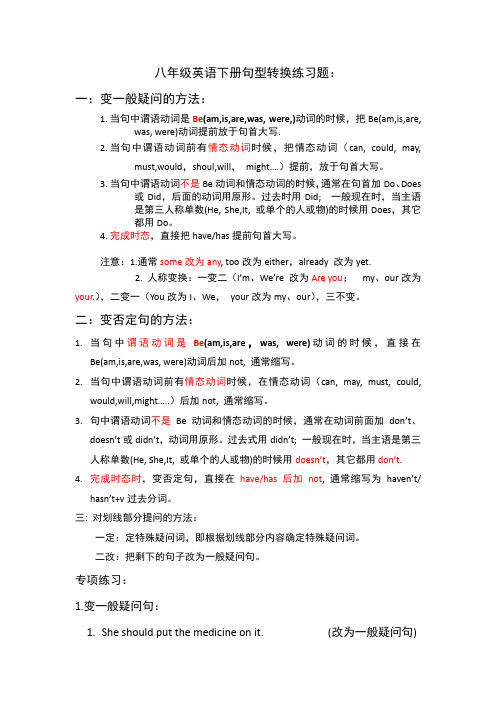
八年级英语下册句型转换练习题:一:变一般疑问的方法:1.当句中谓语动词是Be(am,is,are,was, were,)动词的时候,把Be(am,is,are,was, were)动词提前放于句首大写.2.当句中谓语动词前有情态动词时候,把情态动词(can, could, may,must,would,shoul,will,might….)提前,放于句首大写。
3.当句中谓语动词不是Be动词和情态动词的时候,通常在句首加Do、Does或Did,后面的动词用原形。
过去时用Did; 一般现在时,当主语是第三人称单数(He, She,It, 或单个的人或物)的时候用Does,其它都用Do。
4.完成时态,直接把have/has提前句首大写。
注意:1.通常some改为any, too改为either,already 改为yet.2. 人称变换:一变二(I’m、We’re 改为Are you;my、our改为your.),二变一(You改为I、We,your改为my、our),三不变。
二:变否定句的方法:1.当句中谓语动词是Be(am,is,are,was, were)动词的时候,直接在Be(am,is,are,was, were)动词后加not, 通常缩写。
2.当句中谓语动词前有情态动词时候,在情态动词(can, may, must, could,would,will,might…..)后加not, 通常缩写。
3.句中谓语动词不是Be动词和情态动词的时候,通常在动词前面加don’t、doesn’t或didn’t,动词用原形。
过去式用didn’t; 一般现在时,当主语是第三人称单数(He, She,It, 或单个的人或物)的时候用doesn’t,其它都用don’t. 4.完成时态时,变否定句,直接在have/has后加not, 通常缩写为haven’t/hasn’t+v过去分词。
三: 对划线部分提问的方法:一定:定特殊疑问词,即根据划线部分内容确定特殊疑问词。
一般疑问句否定句练习题
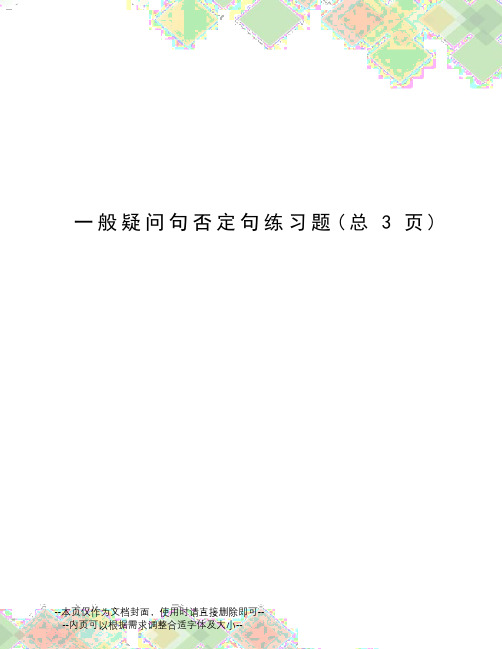
一般疑问句否定句练习题(总3页)--本页仅作为文档封面,使用时请直接删除即可----内页可以根据需求调整合适字体及大小--一般疑问句,否定句习题一、陈述句变一般疑问句,否定句1. His father is an English teacher.一般疑问句: ___________________________________________否定句: ___________________________________________2. These cats are crying.(喊叫)一般疑问句:___________________________________________否定句: ___________________________________________3. You had better go out for a walk .一般疑问句: ___________________________________________否定句: ___________________________________________4. I like to read(阅读) English. 一般疑问句:___________________________________________否定句: ___________________________________________5. Tom goes to school on foot.(走路)一般疑问句: __________________________________________否定句: ___________________________________________6. He likes English. 一般疑问句:___________________________________________否定句: ___________________________________________7. His father goes to work by bus.(乘公共汽车)一般疑问句:___________________________________________否定句: ___________________________________________8. He is crying(哭) under the tree. 一般疑问句:___________________________________________否定句: ___________________________________________9. His birthday is on the twentieth of November. 一般疑问句:___________________________________________否定句: ___________________________________________10. There is a big shop near our school. 一般疑问句:___________________________________________否定句: ___________________________________________11. Kitty is wearing her new uniform. 一般疑问句:___________________________________________否定句: ___________________________________________12. The boy under the tree(树) is hungry.(饥饿) 一般疑问句:___________________________________________否定句: ___________________________________________13. He goes to school every day. 一般疑问句:___________________________________________否定句: ______________________________________14. Tom needs to do his homework by himself.一般疑问句:___________________________________________否定句: ___________________________________________15. She wants a cup(杯)of coffee(咖啡).一般疑问句:___________________________________________否定句: ___________________________________________16. Mrs. Li and Kitty watch TV at night(在晚上).一般疑问句:__________________________________________否定句: ___________________________________________17. I do my homework(家庭作业) after school. 一般疑问句:___________________________________________否定句: ___________________________________________18. Everybody is in the classroom. 一般疑问句:__________________________________________否定句: ___________________________________________19. The boy does some housework(家庭作业)at home. 一般疑问句:__________________________________________否定句: ___________________________________________20. The children had a good time in the park(公园). 一般疑问句:___________________________________________否定句: ___________________________________________二、作肯定和否定回答1、Is this your pencil-case 肯定回答:_________________. 否定回答:___________________.2、Is that his backpack 肯定回答:_________________. 否定回答:___________________.3、Are these her brothers 肯定回答:_________________. 否定回答:___________________.4、Are those Tom’s parents肯定回答:_________________. 否定回答:___________________.5、Can you play the guitar 肯定回答:_________________. 否定回答:___________________.6、Is this your sister 肯定回答:________________. 否定回答:___________________.7、Is this my pen 肯定回答:_______________. 否定回答:___________________.8、Do you all(都、全部) at school肯定回答:___________. 否定回答:___________________.9、Do they like French fries肯定回答:_________________. 否定回答:___________________.10、Does he like pears 肯定回答:_________________. 否定回答:___________________.11、Is that a Chinese car 肯定回答:________________. 否定回答:___________________.12、Is Tom cool 肯定回答:__________________ 否定回答:___________________.13、Are you a good student 肯定回答:__________________. 否定回答:___________________.14、Can she speak English肯定回答:___________________.否定回答:___________________.15、Can you speak Chinese肯定回答:________________ 否定回答:___________________.16、Can he play chess 肯定回答:_______________. 否定回答:___________________.17、May I ask your question肯定回答:___________________.否定回答:___________________.18、Do you like salad 肯定回答:_________________. 否定回答:___________________.19、Is he your father 肯定回答:___________________.否定回答:___________________.20、Are you from China. 肯定回答:___________________.否定回答:___________________.特殊疑问句习题一根据句意,特殊疑问词来完成句子。
高中英语 陈述句变否定句和一般疑问句练习题 试题
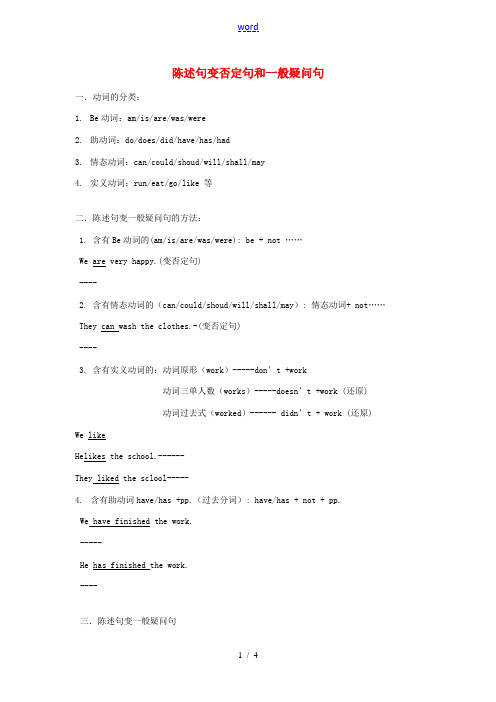
陈述句变否定句和一般疑问句一.动词的分类:1.Be动词:am/is/are/was/were2.助动词:do/does/did/have/has/had3.情态动词:can/could/shoud/will/shall/may4.实义动词:run/eat/go/like 等二.陈述句变一般疑问句的方法:1. 含有Be动词的(am/is/are/was/were): be + not ……We are very happy.(变否定句)----2. 含有情态动词的(can/could/shoud/will/shall/may): 情态动词+ not……They can wash the clothes.-(变否定句)----3. 含有实义动词的:动词原形(work)-----don’t +work动词三单人数(works)-----doesn’t +work (还原)动词过去式(worked)------ didn’t + work (还原) We likeHelikes the school.------They liked the sclool-----4.含有助动词have/has +pp.(过去分词): have/has + not + pp.We have finished the work.-----He has finished the work.----三.陈述句变一般疑问句1. 含有be动词的(am/is/are/was/were): be 动词提前,依次照抄He is a good student.2. 含有情态动词的(can/could/shoud/will/shall/may): 情态动词提前,依次照抄 Tom will go to the park.3. 含有实义动词的动词原形(study)-----Do 提问,依次照抄动词三单人数(studies)----Does 提问实义动词还原(study),动词过去式(studied)------Did 提问,实义动词还原(study)I getShe getsThey got5.含有have/has +pp(过去分词). :have/Has 提前,剩下的依次照抄Jack has eatenWe have learned English for two years.----练习题1.Jill has lunch at school every day. (改为否定句)Jill _____ _____ lunch at school every day.2.The children had a good time at the party. (改为否定句)The children ______ _____ a good time at the party.*3Rose drank some milk this morning.(改为否定句)Rose ______ ______ _____ milk this morning.*4.There's something wrong with his bike.(改成疑问句)______ _____ _______ wrong with his bike?5. Those Japanese like Chinese food.(改成疑问句)______ those Japanese ________ Chinese food?*6.She does exercises at home in the evening.(改成否定句、一般疑问句)She ______ ______ exercises at home in the evening.______ she _____ exercises at home in the evening?7. The worker has visited the factory already.(改成否定句、一般疑问句)The worker _____ _____ the factory ______.____ the worker ______ the factory ____?*8. There are some flowers.( 改成否定句、一般疑问句)_____ are _____ _____ flowers._____ there _____ flowers?9. He is watching TV now.(改成否定句、一般疑问句)He ____ ______watching TV now____ he _____ TV now?10. Sarah can clean the classroom. ( 改成否定句、一般疑问句)Sarah ____ _____clean the classroom._____ Sarah ____ the classroom.*11. We do our homewor at school.We ____ _____ our homewor at school.____ you _____ your homewor at school?*12 Jim does his homewor at school.Jim ____ _____ his homewor at school____ Jim _____ his homewor at school*13. The boy has a red book.(变否定句)The boy ____ ____ a red book.*14. The boy has gone to Beijing. .(变否定句) The boy ____ _____ to Beijing.。
一般疑问句否定句练习题
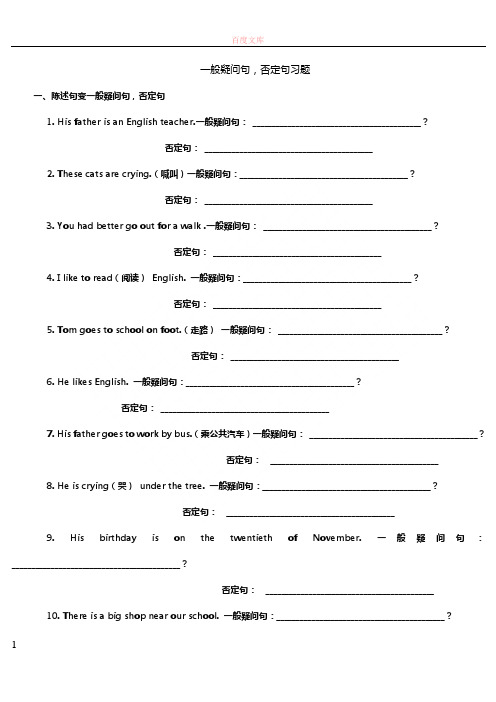
一般疑问句,否定句习题一、陈述句变一般疑问句,否定句1. His father is an English teacher.一般疑问句:___________________________________________ ?否定句:___________________________________________2. These cats are crying.(喊叫)一般疑问句:___________________________________________ ?否定句:___________________________________________3. You had better go out for a walk .一般疑问句:___________________________________________ ?否定句:___________________________________________4. I like to read(阅读)English. 一般疑问句:___________________________________________ ?否定句:___________________________________________5. Tom goes to school on foot.(走路)一般疑问句:__________________________________________ ?否定句:___________________________________________6. He likes English. 一般疑问句:___________________________________________ ?否定句:___________________________________________7. His father goes to work by bus.(乘公共汽车)一般疑问句:___________________________________________ ?否定句:___________________________________________8. He is crying(哭)under the tree. 一般疑问句:___________________________________________ ?否定句:___________________________________________9. His birthday is on the twentieth of November. 一般疑问句:___________________________________________ ?否定句:___________________________________________10. There is a big shop near our school. 一般疑问句:___________________________________________ ?否定句:___________________________________________11. Kitty is wearing her new uniform. 一般疑问句:___________________________________________ ?否定句:___________________________________________12. The boy under the tree(树) is hungry.(饥饿) 一般疑问句:___________________________________________ ?否定句:___________________________________________13. He goes to school every day. 一般疑问句:___________________________________________ ?否定句:______________________________________14. Tom needs to do his homework by himself.一般疑问句:___________________________________________ ?否定句:___________________________________________15. She wants a cup(杯)of coffee(咖啡).一般疑问句:___________________________________________ ?否定句:___________________________________________16. Mrs. Li and Kitty watch TV at night(在晚上).一般疑问句:__________________________________________ ?否定句:___________________________________________17. I do my homework(家庭作业)after school. 一般疑问句:___________________________________________ ?否定句:___________________________________________18. Everybody is in the classroom. 一般疑问句:__________________________________________ ?否定句:___________________________________________19. The boy does some housework(家庭作业)at home. 一般疑问句:__________________________________________ ?否定句:___________________________________________20. The children had a good time in the park(公园). 一般疑问句:___________________________________________ ?否定句:___________________________________________二、作肯定和否定回答1、Is this your pencil-case? 肯定回答:_________________. 否定回答:___________________.2、Is that his backpack? 肯定回答:_________________. 否定回答:___________________.3、Are these her brothers? 肯定回答:_________________. 否定回答:___________________.4、Are those Tom’s parents?肯定回答:_________________. 否定回答:___________________.5、Can you play the guitar? 肯定回答:_________________. 否定回答:___________________.6、Is this your sister? 肯定回答:________________. 否定回答:___________________.7、Is this my pen? 肯定回答:_______________. 否定回答:___________________.8、Do you all(都、全部) at school?肯定回答:___________. 否定回答:___________________.9、Do they like French fries?肯定回答:_________________. 否定回答:___________________.10、Does he like pears? 肯定回答:_________________. 否定回答:___________________.11、Is that a Chinese car? 肯定回答:________________. 否定回答:___________________.12、Is Tom cool? 肯定回答:__________________ 否定回答:___________________.13、Are you a good student? 肯定回答:__________________. 否定回答:___________________.14、Can she speak English?肯定回答:___________________.否定回答:___________________.15、Can you speak Chinese?肯定回答:________________ 否定回答:___________________.16、Can he play chess? 肯定回答:_______________. 否定回答:___________________.17、May I ask your question?肯定回答:___________________.否定回答:___________________.18、Do you like salad? 肯定回答:_________________. 否定回答:___________________.19、Is he your father? 肯定回答:___________________.否定回答:___________________.20、Are you from China. 肯定回答:___________________.否定回答:___________________.特殊疑问句习题一根据句意,特殊疑问词来完成句子。
肯定句变否定句和一般疑问句类型_习题(整理了答案)备课讲稿
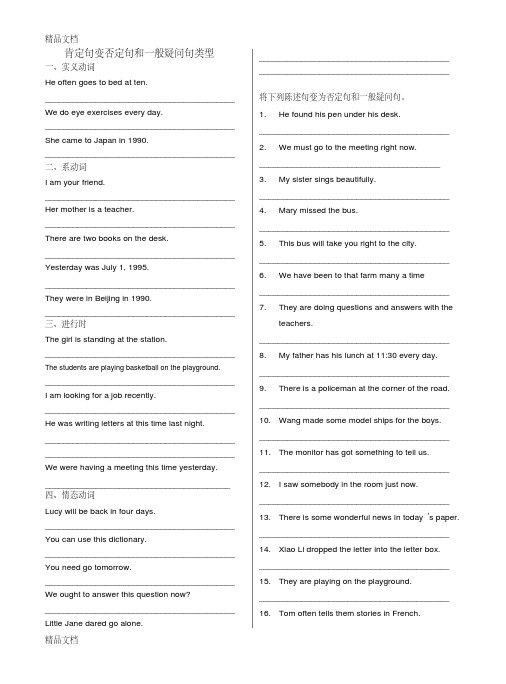
肯定句变否定句和一般疑问句类型一、实义动词He often goes to bed at ten._________________________________________ We do eye exercises every day._________________________________________ She came to Japan in 1990._________________________________________二、系动词I am your friend._________________________________________ Her mother is a teacher._________________________________________ There are two books on the desk._________________________________________ Yesterday was July 1, 1995._________________________________________ They were in Beijing in 1990._________________________________________ 三、进行时The girl is standing at the station._________________________________________ The students are playing basketball on the playground._________________________________________ I am looking for a job recently._________________________________________ He was writing letters at this time last night._________________________________________ _________________________________________ We were having a meeting this time yesterday.________________________________________ 四、情态动词Lucy will be back in four days._________________________________________ You can use this dictionary._________________________________________ You need go tomorrow._________________________________________ We ought to answer this question now?_________________________________________ Little Jane dared go alone. __________________________________________________________________________________将下列陈述句变为否定句和一般疑问句。
改为否定句和一般疑问句 专练

改为否定句和一般疑问句练习题:1.She is a girl.She is smiling.She was smiling.She is going to play the vilion.She was going to play the vilion.2.They are students.They are reading.They were reading.They are going to read.They were going to read.3.I am a boy .I am running.I was running.I am invited to the party.I am going to the party.I was going to the party.4.We were students.He was a teachter.The room is cleaned by him every day.The machines are made by the workers in the factory. He was invited to the party.We were invited to the party.5. There is a little water in the glass.There are two birds in the tree.There was a map on the wall.There will be a football match tomorrow.There is going to be a football match tomorrow. There are going to be two football matches tomorrow. There used to be many trees in the forests.He is used to getting up early.He used to get up early.He uses knives to cut the apple into pieces.The book is used for reading.He can drive a car.I could skate well.We should help him.You’d better take a map.He’d like a book about robots.We ought to walk or take a bus.They like pens.We play basketball after school.He watches TV every dayHe studies Japanese .Ann returned the book to the library yesterday.They bought a new bike yesterday.The book cost him 20 yuan.We often do sports after school.Kate does morning exercises every day.They did a good job.Lucy has apples for lunch..We have brothers and sisters.Mike had a car.He has gone to Cuba.I have been in Beijing for a month..They have to say goodbye .She has to do housework.The old man had to live in the village.You will be a singer.You will be able to finish the job.I would like to go out for a walk.(否定句)He may go now.-He may not go now.-May he go now?Yes,he may./Yes he canNo,he may not./No,he can’t./No,he mustn’tYou must finish the work.-You mustn’t finish the work.-Must I finish the work?Yes,you must.No, you needn’t ./You don’t have to .Both of them were going to read.All of us were students.There's something to eat in the cupboard.There were some fish swimming in the river.I could swim well, too.Jane has already been to Mount Tai.Open the window.Please pass me the ball.用do does be 填空1> _____ she know all the answers ? Yes , she ____ . No, she _____.2> _____ the twins often fight ? Yes ,_____ do. No, _____ don’t.3> _____ your dad like listening to music? Yes ,____ does . No, _____ doesn’t.4>_____ uncle Tom wash his car everyday? Yes , ____ does . No, ____ doesn’t.5> _____ you have a new teacher? Yes , I ______. No, I ______.6>_____ she a teacher? Yes, she _____ . No, she _____.7> ______ you playing ball now? Yes, I ______. No, I ______.8> ______ the pig like to sleep? Yes, it ______. No, it _____.9> ______ five birds flying in the sky? Yes, they _____ .No, ____ aren’t.10> _____ your father smoking in the living room? Yes, ____ is .No, he _____.特殊疑问句练习1)对指物名词或谓语动词提出疑问,疑问词用what①The twins were making a kite when their mother came in. (划线提问)______ _____ the twins _____ when their mother came in?②Mrs Turner asked her son to buy some eggs for supper. (划线提问)_______ ______ Mrs Turner ask her son ______ _______?2)对名词前定语提出疑问,疑问词应用which,而且必须和名词连用。
一般疑问句和否定句练习题
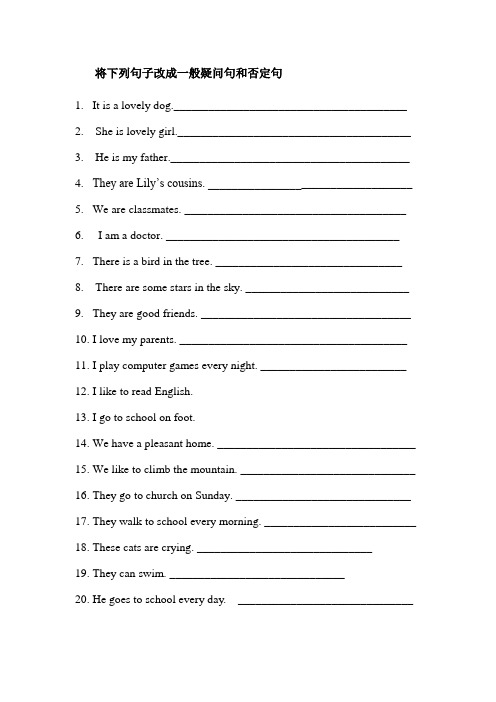
将下列句子改成一般疑问句和否定句1. It is a lovely dog.________________________________________2. She is lovely girl.________________________________________3. He is my father._________________________________________4. They are Lily’s cousins. ___________________________________5. We are classmates. ______________________________________6. I am a doctor. ________________________________________7. There is a bird in the tree. ________________________________8. There are some stars in the sky. ____________________________9. They are good friends. ____________________________________10. I love my parents. _______________________________________11. I play computer games every night. _________________________12. I like to read English.13. I go to school on foot.14. We have a pleasant home. __________________________________15. We like to climb the mountain. ______________________________16. They go to church on Sunday. ______________________________17. They walk to school every morning. __________________________18. These cats are crying. ______________________________19. They can swim. ______________________________20. He goes to school every day. ______________________________用do does be 填空1. _____ she know all the answers ? Yes , she ____ . No, she _____.2. _____ the twins often fight ? Yes ,_____ do. No, _____ don’t.3. _____ your dad like listening to music?Yes ,____ does . No, _____ doesn’t.4._____ uncle Tom wash his car every day?Yes , ____ does . No, ____ doesn’t.5. _____ you have a new teacher? Yes , I ______. No, I ______.6._____ she a teacher? Yes, she _____ . No, she _____.7. ______ you playing ball now? Yes, I ______. No, I ______.8. ______ the pig like to sleep? Yes, it ______. No, it _____.9. ______ five birds flying in the sky?Yes, they _____ .No, ____ aren’t.10. _____ your father smoking in the living room?Yes, ____ is .No, he _____.。
used to否定句和疑问句

used to否定句和疑问句
"Used to" 是一个表示过去习惯或过去经常做某事的短语。
在否定句和疑问句中,它的形式和用法略有不同。
否定句:
在否定句中,我们通常使用 "didn't used to" 或 "haven't used to" 的形式。
例如:
1. They didn't used to live in the city.
2. We haven't used to go to the park every Sunday.
疑问句:
在疑问句中,我们通常使用 "used to" 直接跟动词原形。
例如:
1. Did you used to play basketball?
2. Did they used to eat pizza every Friday?
请注意,"Used to" 的动词要用原形,这是因为它实际上是表示过去经常发生的动作,而不是表示现在的能力或可能性。
以上是used to否定句和疑问句的信息。
英语句型转换陈述句变否定句一般疑问句特殊疑问句练习

句型转换的方法一、肯定陈述句改否定陈述句的方法——一步法1、在be动词后加not。
如:is not ,are not ,am not,was not,were not;2、在can,should,will等情态动词后加not。
如:cannot,should not,will not;3、have/has与got连用时在后面加not,,如果单独使用则借用助动词否定形式don’t / doesn’t / didn’t。
4、上述都没有的,在动词前加助动词否定形式don’t / doesn’t / didn’t。
5、some 改成any。
练习:把下面的句子变成否定句。
1.She is watching TV now.2.We go to school on Sunday.3. His father works hard.4..I can see some birds in the tree. .5.The cat runs fast.6.They like reading books.7.My grandpa gives me a hot dog.8.Tom often walks to school.9.I have a doll.10.I have got a doll.二、肯定句改一般疑问句的方法——三步法1、把be动词放在句首,剩下的照抄,(some 改成any,my改成your等)句点改成问号。
例如:陈述句: They are in the park.一般疑问句: Are they in the park?2、把can,shall,will等情态动词放到句首,剩下的照抄,(some 改成any,my改成your等)句点改成问号。
例如:陈述句: He can play the guitar.一般疑问句: Can he play the guitar?3、have/has与got连用时直接放在句首,如果单独使用则借用助动词do/does/did4、上述都没有的,在句首请助动词Do/Does/Did帮忙,剩下的照抄,(some 改成any,my改成your等)句点改成问号。
变一般疑问句、否定句、划线部同义句专项习题(七下)

七年级英语下册句型转换练习题:一:变一般疑问的方法:1.当句中谓语动词是Be(am,is,are,was, were,)动词的时候,把Be(am,is,are,was, were)动词提前放于句首大写.2.当句中谓语动词前有情态动词时候,把情态动词(can, could, may,must,would)提前,放于句首大写。
3.当句中谓语动词不是Be动词和情态动词的时候,通常在句首加Do、Does或Did,后面的动词用原形。
过去时用Did; 一般现在时,当主语是第三人称单数(He, She,It, 或单个的人或物)的时候用Does,其它都用Do。
注意:1.通常some改为any, too改为either。
2. 人称变换:一变二(I’m、We’re 改为Are you;my、our改为your.),二变一(You改为I、We,your改为my、our),三不变。
二:变否定句的方法:1.当句中谓语动词是Be(am,is,are,was, were)动词的时候,直接在Be(am,is,are,was, were)动词后加not, 通常缩写。
2.当句中谓语动词前有情态动词时候,在情态动词(can, may, must, could,would)后加not, 通常缩写。
(初一上册作为了解)3.句中谓语动词不是Be动词和情态动词的时候,通常在动词前面加don’t、doesn’t或didn’t,动词用原形。
过去式用didn’t; 一般现在时,当主语是第三人称单数(He, She,It, 或单个的人或物)的时候用doesn’t,其它都用don’t. 三: 对划线部分提问的方法:一定:定特殊疑问词,即根据划线部分内容确定特殊疑问词。
二改:把剩下的句子改为一般疑问句。
专项练习:1.变一般疑问句及回答:1.I can play the drum well. (改为一般疑问句及肯定回答)________ _________ play the drum well?Yes, _________ ____________.2.Kevin and Jim can play soccer. (改为一般疑问句及否定回答)_______Kevin and Jim _______ soccer?No,__________ ________.3.Lucy is watching TV in her room. (改为一般疑问句)________Lucy ________ TV in her room?4.They are playing chess under the tree. (改为一般疑问句)______ they ________ chess under the tree?5.Their school trip was great last weekend. (改为一般疑问句)________ their school trip ________ last weekend?6.They were in the park yesterday. (改为一般疑问句及肯定回答) ________ __________ in the park yesterday?Yes,________ ________.7.I did my homework the day before yesterday. (改为一般疑问句及肯定回答)_______ you________ your homework the day before yesterday? Yes,__________ __________.8.She visited her uncle last Sunday. (改为一般疑问句及否定回答) _________ she ________her uncle last Sunday?No,__________ _____________.9.She gets up at six every morning. (改为一般疑问句)________ she _________ up at six every morning?10.T om goes to school on foot every day. (改为一般疑问句)_________ Tom _________ to school on foot every day?11.L isa comes from Hainan. (改为一般疑问句)_________ Lisa __________ from Hainan?12.David is cleaning his room now. (改为一般疑问句)________ David _______ his room now?13.T hey are swimming in the river. (改为一般疑问句)______they ______in the river?14.T here is some water in the cup. (改为一般疑问句)________ _______ any water in the cup?15.S he can draw, too. (改为一般疑问句)________ she draw, _______?16.T here are some boxes on the sofa. (改为一般疑问句及肯定回答) ______ there_______ boxes on the sofa?Yes,_________ ___________.17.I would like some beef noodles . (改为一般疑问句)_________ you like _________ beef noodles?18.I bought some pens last week. (改为一般疑问句)_________ you ________ any pens last week?19.I can play the violin, too. (改为一般疑问句)________ you play the violin, __________?20.I have some apples for breakfast. (改为一般疑问句)_________ you have _______apples for breakfast?2.变否定句:1.Tom can sing English songs. (改为否定句)Tom________ _________English songs.2.He can play basketball and soccer. (改为否定句)He__________play basketball ______soccer.3.He does his homework at 8:00. (改为否定句)He_________ _________ his homework at 8:00.4.I’m playing basketball with my friend now. (改为否定句)I’m_______ ________ basketball with my friend now.5.She was a worker in a shop. (改为否定句)She_______ _________ a worker in a shop.6.My father can draw well.(改为否定句)My father_______ _________ well.7.It takes me half an hour to walk to school every day. (改为否定句)It_______ _______me half an hour to walk to school every day.8.He can play the violin, too. (改为否定句)He ______ play the violin,____________.9.She likes to watch TV. (改为否定句)She________ _______to watch TV.10.Mark and Dave are washing the dishes now. (改为否定句)Mark and Dave _______ _______the dishes now.11.T om wants to play soccer with Kevin. (改为否定句)Tom_________ _______to play soccer with Kevin.12.M ike is reading at home now. (改为否定句)Mike________ __________ at home now.13.H e’s playing soccer in the school now. (改为否定句)He___________ ________ soccer in the school now. 14.There are some restaurants near the bank. (改为否定句) There________ ________ restaurants near the bank. 15.T he boy has short curly hair.(改为否定句)The boy_________ _________ short curly hair.16.H e swam in the river yesterday. (改为否定句)He_________ ________ in the river yesterday.17.S he went to the park last night. (改为否定句)She__________ __________ to the park last night. 18.Tom and Jim cleaned the room last night.(改为否定句) Tom and Jim _________ ________ the room last night.19.He lived in Beijing in 2001. (改为否定句)He ________ ________ in Beijing in 2001.20.I was a teacher 10 years ago.(改为否定句)I ________ _________ a teacher 10 years ago.特殊:Arrive late for class, Linda._________ ________ late for class, Linda.3.对划线部分提问:1. He can play the guitar . (对划线部分提问)_______ can he ______?2.I can play the violin. (对划线部分提问)_________ can you _______ ?3.She usually gets up at six. (对划线部分提问)________ _________ does she usually get up?4.She usually gets up at six. (对划线部分提问)________ _________ she usually get up?5.I usually go to school on foot. (对划线部分提问)_________ do you usually _______to school?6.It’s 6 kilometers from my home to school. (对划线部分提问)_________ _______ is it from your home to school?7.It usually takes about 10 minutes to go there by bike. (对划线部分提问)_________ _______ does it usually take to go there by bike? 8.It’s about 10 minutes’ ride from my home to school. (对划线部分提问)_________ _______is it from your home to school?9.We can listen to music in the music room. (对划线部分提问)_________ _______you listen to music?10.I like music because it’s relaxing. (对划线部分提问)_________ _______you like music?11.P andas are from China. (对划线部分提问)_________ _______ pandas from?12.T he boy is swimming in the river now. (对划线部分提问)_________ is the boy _______ in the river now?13.T he weather is sunny today. (对划线部分提问)_________ the weather _______ today?14.I t’s cloudy in Chongqing today. (对划线部分提问)_________ _______the weather in Chongqing today? 15.T he new library is next to the park. (对划线部分提问)_________ _______the new library?16.S he is tall and thin. (对划线部分提问)_________ _______she look like?17.I’d like a large bowl. (对划线部分提问)_________ _______ would you like?18.S he’d like beef noodles. (对划线部分提问)_________ _______of noodles would she like?19.T he trip to the sea was boring. (对划线部分提问)_________ _______the trip to the sea?20.S he went to the park last night. (对划线部分提问)________ did she_________ last night?4.同义句转换:1. I usually walk to school. (改为同义句)I usually go to school_________ ___________.2.She sometimes takes the bus to school. (改为同义句)She usually go to school________ _______.3.She is from Beijing. (改为同义句)She ________ __________ Beijing.4.She was from Beijing 2 years ago? (改为同义句)She__________ ________ Beijing 2 years ago?5.What’s the weather like today. (改为同义句)__________ ___________the weather today?6.I had a good time this afternoon. (改为同义句)I_________ _________ this afternoon.7.His house is near our school. (改为同义句)His house is_________ ________ our school?8.It takes me half an hour to walk to school. (改为同义句)I__________ half an hour __________ to school.9.The man is not tall or short. (改为同义句)The man is of _________ ________.10.The boy has short curly hair. He wears glasses (改为同义句)The boy_______ short curly hair________glasses11.He wants me to help him. (改为同义句)He________ _________ me to help him.12.Tom wants some egg noodles. (改为同义句)Tom wants some noodles_________ _______. 13.Do you have time on the weekend? (改为同义句)________your ______ on the weekend?14.She usually gets to school at 7:30. (改为同义句)She usually________ ______ school at 7:30.。
习题
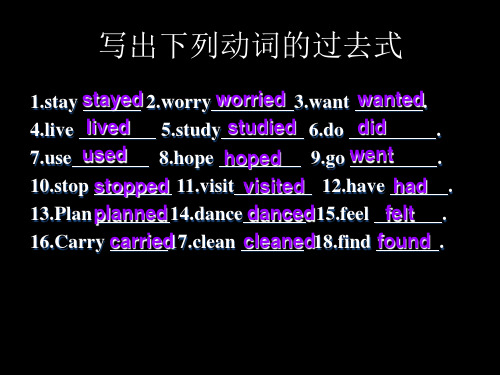
二、根据汉语完成句子
• • • • • • • 1.你的周末过得怎么样?好极了。 1.你的周末过得怎么样?好极了。 你的周末过得怎么样 ? It was gret . How was your weekend 2.你上周末做什么了?我去看我妹妹了。 2.你上周末做什么了 我去看我妹妹了。 你上周末做什么了? What did you do last weekend ? I visited my sister. 3.昨晚我学习地理了。 3.昨晚我学习地理了 昨晚我学习地理了。 I studied Geography yesterday evening. 4.你上周末做作业了吗? 4.你上周末做作业了吗 你上周末做作业了吗? Did you do your homeworklast weekend? • 5.你什么时候弹吉他的?昨天晚上。 5.你什么时候弹吉他的 昨天晚上。 你什么时候弹吉他的? • When did you play the guitar? Last night.
随堂练习
1.I
C soccer yesterday. A. play B. plays C. played D. playing 2.What you B last night? A. do,do B. did,do C. did,did D. do,did C 3.What about a party?
• 1. I played tennis last weekend.(对划线部分提问) weekend.(对划线部分提问) What did you last weekend? do 2. Did she go to the park on weekends? (做否定回答) (做否定回答 做否定回答) No • ,she didn’t . 3. They went to the beach last Sunday.(对划线部分提问 Sunday.(对划线部分提问 • Where did they go last Saturday/? • 4. She cleaned her room yesterday.(改为一般疑问句) yesterday.(改为一般疑问句 改为一般疑问句) • Did she clean her room yesterday?? • 5.He played computer games last night.(对划线部分提 night. 问) When did he play • computer games?
陈述句变否定句一般疑问句特殊疑问句及练习
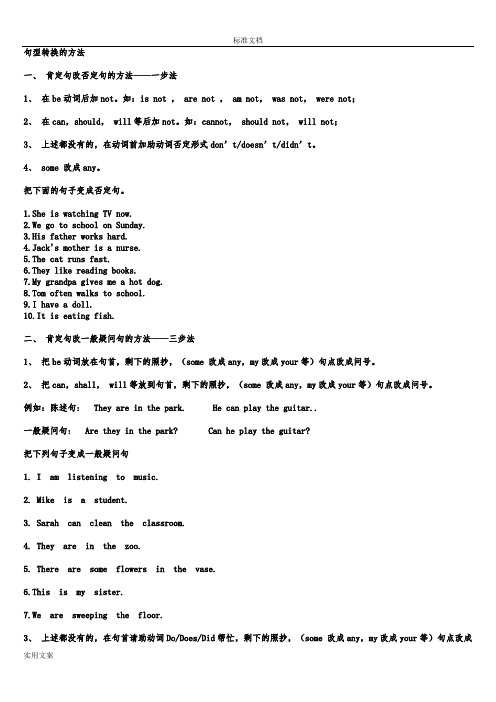
句型转换的方法一、肯定句改否定句的方法——一步法1、在be动词后加not。
如:is not , are not , am not, was not, were not;2、在can,should, will等后加not。
如:cannot, should not, will not;3、上述都没有的,在动词前加助动词否定形式don’t/doesn’t/didn’t。
4、 some 改成any。
把下面的句子变成否定句。
1.She is watching TV now.2.We go to school on Sunday.3.His father works hard.4.Jack's mother is a nurse.5.The cat runs fast.6.They like reading books.7.My grandpa gives me a hot dog.8.Tom often walks to school.9.I have a doll.10.It is eating fish.二、肯定句改一般疑问句的方法——三步法1、把be动词放在句首,剩下的照抄,(some 改成any,my改成your等)句点改成问号。
2、把can,shall, will等放到句首,剩下的照抄,(some 改成any,my改成your等)句点改成问号。
例如:陈述句: They are in the park. He can play the guitar..一般疑问句: Are they in the park? Can he play the guitar?把下列句子变成一般疑问句1. I am listening to music.2. Mike is a student.3. Sarah can clean the classroom.4. They are in the zoo.5. There are some flowers in the vase.6.This is my sister.7.We are sweeping the floor.3、上述都没有的,在句首请助动词Do/Does/Did帮忙,剩下的照抄,(some 改成any,my改成your等)句点改成问号。
初中英语一般疑问句否定句练习题 (1)

浅谈实施优质护理服务的优点及临床实践分析优质护理服务是指在医疗护理过程中,为每位患者提供专业、贴心、安全、有效、高效的护理服务,以确保患者的身体和心理健康,提高患者的满意度和治疗效果。
在临床实践中,实施优质护理服务具有诸多优点,并且能够有效提升医护人员的专业能力和服务水平。
本文将针对实施优质护理服务的优点以及临床实践分析进行探讨。
实施优质护理服务能够为患者提供更好的治疗体验。
医护人员在护理过程中,通过友善、贴心的沟通和关怀,能够极大地提升患者的舒适感和治疗体验,帮助患者缓解焦虑和恐惧情绪,增强患者对治疗的信心,提高患者的治疗依从性和治疗效果。
优质护理服务还能够满足患者的个性化需求,提供个性化的护理方案和服务,使患者感受到医护人员的关心和关爱,从而增强患者的抗病能力和自我康复能力。
实施优质护理服务有助于提升医护人员的专业水平和服务质量。
医护人员在实施优质护理服务的过程中,需要不断学习和提升自己的专业知识和技能,不断完善护理技术和服务能力,提高服务质量和服务水平。
通过不断的学习和积累,医护人员能够更好地理解患者的需求,更好地满足患者的期望,更好地应对医疗护理中的复杂问题和突发情况,提高医护团队的整体素质和服务水平。
实施优质护理服务能够提升医院的声誉和竞争力。
优质护理服务能够给患者留下良好的印象,使患者产生好的口碑,增强患者对医院的信任和满意度,提高患者对医院的认可度和忠诚度。
在激烈的医疗市场竞争中,优质护理服务成为医院吸引和留住患者的重要法宝,有助于提升医院的声誉和竞争力,帮助医院树立良好的品牌形象,吸引更多患者前来就诊和就医。
实施优质护理服务有利于提高医疗护理的整体效益和经济效益。
优质护理服务能够提高患者的治疗效果和康复速度,减少康复期间的并发症和并发症的发生率,降低患者的住院时间和治疗成本,提高医院的床位周转率和资源利用效率,降低医疗护理的整体成本,提高医院的经济效益和社会效益。
优质护理服务还能够减少患者的再次就诊率和住院率,降低医疗保健的总体成本,提高全社会的医疗护理效益,促进医疗卫生事业的可持续发展。
used to结构的用法 附练习题
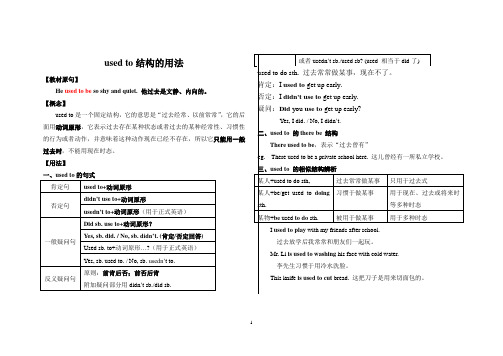
【教材原句】He used to be so shy and quiet. 他过去是文静、内向的。
【概念】used to是一个固定结构,它的意思是“过去经常、以前常常”,它的后面用动词原形,它表示过去存在某种状态或者过去的某种经常性、习惯性的行为或者动作,并意味着这种动作现在已经不存在,所以它只能用一般过去时,不能用现在时态。
【用法】一、used to的句式语法精练一、用括号内所给单词的适当形式填空。
1. My sister used (play) soccer.2. She is used to (get) up early.3. Wood(木头) is used (make) desks, chairs and so on.4. you (use) to wear glasses?5. Emily didn’t (use) to eat a lot of vegetables.6. She used to ______ (walk) to school, but now she is used to _________ (ride)a bike.7. He didn’t use __________ (like) tests.二、根据汉语提示完成句子,每空一词。
1.He (曾经是) a history teacher in our school. 2.There (曾经有) a school near the village. 3.She is (习惯于) walking after supper.4.Wood is (被用来制造) make paper.5.The Blacks (习惯于) eating with chopsticks. 三、按要求完成下列句子,每空一词。
1.My sister used to play tennis after school.(改为一般疑问句并作否定回答) —your sister tennis after school?—No, she .2.Jim used to be a quiet boy.(改为否定句)Iim a quiet boy.3.He used to wear glasses. (完成反意疑问句)He used to wear glasses, ?4.I used to visit my aunt once a month. (变为一般疑问句并肯定回答) you visit your aunt once a month?Yes, _______ ____________.5.Mary used to watch scary movies. (改为否定句)Mary to watch scary movies.四、单项选择( ) 1.Mary, you _____ be short, but now you are tall.A. wereB. areC. use toD. used to( ) 2. My mother _____ us stories when we were children.A. was used to tellB. is used to tellingC. used to tellD. used to telling( ) 3. _______ used to______ an old bookshelf (书架) in my room.A. There; beB. There; haveC. It; beD. There; having( ) 4 He used to swim in the river, ______?A. did heB. didn’t heC. usen’t heD. use he。
一般现在时态和一般过去时态巩固练习题
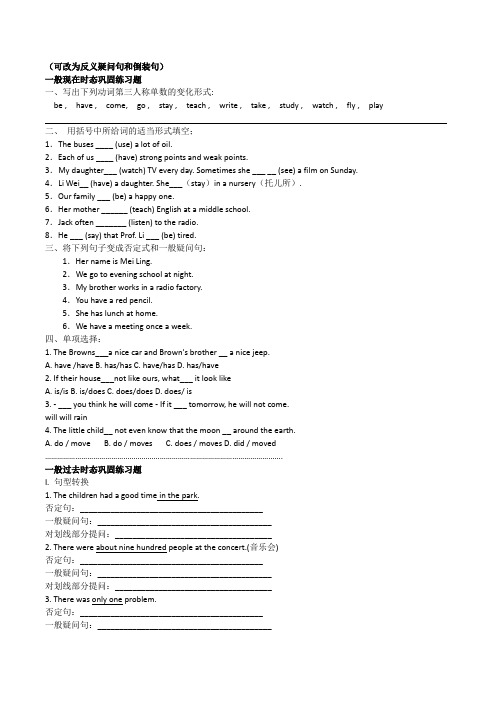
(可改为反义疑问句和倒装句)一般现在时态巩固练习题一、写出下列动词第三人称单数的变化形式:be , have , come, go , stay , teach , write , take , study , watch , fly , play二、用括号中所给词的适当形式填空;1.The buses ____ (use) a lot of oil.2.Each of us ____ (have) strong points and weak points.3.My daughter___ (watch) TV every day. Sometimes she ___ __ (see) a film on Sunday.4.Li Wei__ (have) a daughter. She___(stay)in a nursery(托儿所).5.Our family ___ (be) a happy one.6.Her mother ______ (teach) English at a middle school.7.Jack often _______ (listen) to the radio.8.He ___ (say) that Prof. Li ___ (be) tired.三、将下列句子变成否定式和一般疑问句:1.Her name is Mei Ling.2.We go to evening school at night.3.My brother works in a radio factory.4.You have a red pencil.5.She has lunch at home.6.We have a meeting once a week.四、单项选择:1. The Browns___a nice car and Brown's brother __ a nice jeep.A. have /haveB. has/hasC. have/hasD. has/have2. If their house___not like ours, what___ it look likeA. is/isB. is/doesC. does/doesD. does/ is3. - ___ you think he will come - If it ___ tomorrow, he will not come.will will rain4. The little child__ not even know that the moon __ around the earth.A. do / moveB. do / movesC. does / movesD. did / moved ……………………………………………………………………………………………………….一般过去时态巩固练习题I. 句型转换1. The children had a good time in the park.否定句:__________________________________________一般疑问句:________________________________________对划线部分提问:____________________________________2. There were about nine hundred people at the concert.(音乐会)否定句:__________________________________________一般疑问句:________________________________________对划线部分提问:____________________________________3. There was only one problem.否定句:__________________________________________一般疑问句:________________________________________肯定/否定回答:____________________________________4. Ann did her homework yesterday evening.否定句:__________________________________________一般疑问句:________________________________________对划线部分提问:____________________________________5. Last week I read an English book.否定句:__________________________________________一般疑问句:________________________________________肯定/否定回答:____________________________________对划线部分提问:____________________________________6. My brother was in the park just now.否定句:__________________________________________一般疑问句:________________________________________肯定/否定回答:____________________________________对划线部分提问:____________________________________7. She had some bread for lunch today.否定句:__________________________________________一般疑问句:________________________________________肯定/否定回答:____________________________________对划线部分提问:____________________________________8. They read English last night.否定句:__________________________________________一般疑问句:________________________________________肯定/否定回答:____________________________________对划线部分提问:____________________________________一、写出下列动词的三单现、过去式和现在分词go ______ _______ _______ enjoy _______ _______ ________buy ______ ______ _______ eat______ _______ _______get _______ _______ _______ walk ________ _______ ________ take______ ______ ______ dance_______ ________ _______write _______ ______ ______ run______ _______ _______swim_______ _______ _______ find _______ _______ _______ begin______ ______ ______ eat ______ _______ ______play ______ ______ _______ study ______ ______ ________III. 用所给词的适当形式填空。
- 1、下载文档前请自行甄别文档内容的完整性,平台不提供额外的编辑、内容补充、找答案等附加服务。
- 2、"仅部分预览"的文档,不可在线预览部分如存在完整性等问题,可反馈申请退款(可完整预览的文档不适用该条件!)。
- 3、如文档侵犯您的权益,请联系客服反馈,我们会尽快为您处理(人工客服工作时间:9:00-18:30)。
变一般疑问句和否定句专项训练
1.Bob and Tom like action movies and comedies.
变为used to的肯定句_______________________ ______________
疑问句
_______________________ __________________ ?
肯定回答
_______________________ ____________
____________
否定句
_______________________ ____________
2. They want to join the English club.
变为used to的肯定句
_______________________ ______________
_______________________ __________________ ?
____________
否定回答
_______________________ ____________
否定句
_______________________ ____________
4. They watch TV.
变为used to的肯定句_______________________ ______________
_______________________
__________________ (变否定句)
5. Mary has lunch at 12 o’clock..
变为used to的肯定句
_______________________ ______________
_______________________ __________________ ?
肯定回答
_______________________ ____________
否定回答
_______________________ ____________
____________
7. His father is an English teacher.
变为used to的肯定句_______________________ ______________
_______________________ __________________ ? 肯定回答
_______________________ ____________
____________
否定句
_______________________ ____________
8.These cats are running.
变为used to的肯定句_______________________ ______________
_______________________ __________________ ?
____________
否定回答
_______________________ ____________
否定句
_______________________ ____________
9.They swim.
变为used to的肯定句_______________________ ______________
_______________________ __________________ ?
____________
否定回答
_______________________ ____________
否定句
_______________________ ____________
10. I like to read(阅读) English.
_________________________________________ ?
肯定回答_______________ 否定回答___________
否定句 _______________________________ ___
1、He spends 1 hour in doing homework every day.
2、 My father is sending an email to his friend.
3、 I have an English class on Sunday morning.
4、 She feels tired.
5、 I have a big present.
6、My father is in the study(书房).
7,They had a lot of food.
8,He had lunch at school every day last year.
9,There was some ink in the bottle.
10,There was some rain in the north last month.
简单的方法:
找句子里是否有be动词(am, is, are, was, were)情态动词(can, may, must, could, should)
如果有变否定句就可以直接在这些动词后直接加not
变疑问句就将这些词置于主语前
如果没有变否定句要靠助动词don’t, doesn’t, didn’t 来帮助。
变疑问句要靠助动词do, does, did 来帮助。
变一般疑问句口诀:先找be动(am, is, are, was, were)和情态(can, may, must, could,
should),直接提到句首来。
找不到,别急坏,do,does,did
帮忙快。
除了单三用does,其余都用do 来带。
过去时态很
简单,did一人都包揽。
还要小心被some害,改成any才痛
快。
第一人称my和our都变your,I和we改成第二人称
you要谨记。
变否定句口诀:先找be动和情态,找到直接后面带。
找不到,别急坏,don’t,
doesn’t,didn’t当帽子带,帽子上有照妖镜,照得动词现原
形。
还要小心被some害,改成any才痛快。
对划线部分提问步骤:先找一个特殊疑问词代替横线部分并放在句首,再把剩余
部分变成一般疑问句,划线部分去掉,不能出现在新的问句
当中。
